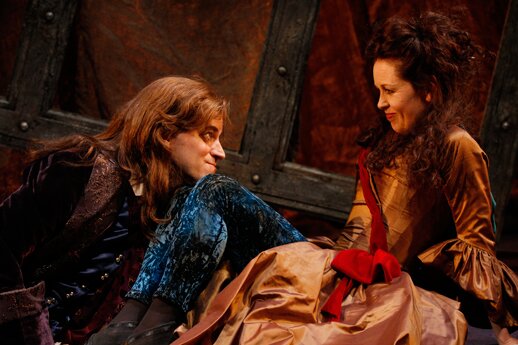
After seeing Or, (through April 22 at Seattle Rep; tickets) for the first time, I screamed over Twitter, “I want to ride it again!” Because it is a ride, make no mistake. It’s a joy-filled, extravagant roller coaster with sex, glam rock, spies, and theatricality. Now, after seeing it again, I have a plea: Liz Duffy Adams, writer of this amazingly funny and smart work, can we please be best friends?
Not only did Adams write a comedy that I enjoyed–a feat unto itself–but she wrote it about Aphra Behn, one of the first known female playwrights, who is also one of the first queer women writers of the stage. Additionally, the entire ensemble of artists involved created a brilliantly cohesive experience that defies the standard I’ve come to expect from Seattle Rep.
The play opens with a Shakespearean (and Behnian) prologue setting up the inherent dichotomies of Aphra Behn’s (Kirsten Potter) character: spy or poetess; mistress or whore; gay or straight, or both; or neither. Next unfolds perhaps the most bizarrely constructed series of events full of gender-bent kings, maids, ladies, lovers, spies, et al., all for the greater good of producing Behn’s first theatrical piece post-espionage work.
Though there were the necessary (and a few painful) theatre in-jokes, I’m happy the play moved toward more interesting ground, exploring instead the relationship between love, sex, and art. Behn’s sexuality and gender presentation is one of the better known tidbits about her (only second to her life as a spy), but the play presents her sexuality in such a refreshingly queer way, never saying it’s bizarre or unusual.
Surprisingly (though it shouldn’t be considering it’s 2012), every character is presented as sexually fluid. When Charles II mistakes Nell Gwynne for a boy, he still propositions her for sex saying he hasn’t had a boy in a long time; discovering she’s a girl becomes a pleasant surprise in which they both revel.
Kirsten Potter’s Behn is gloriously sensual and intense with Nell Gwynne (Montana von Fliss) and Charles II (Basil Harris), but subtle and quietly desperate when her freedom and theatrical future is threatened by an ex-lover and spy, William Scot (also Harris). Montana von Fliss seamlessly shifts between the rough and sexy actress Nell Gwynne to Behn’s loyal and complaining maid. And Basil Harris steals the stage as Lady Davenant, defying you not to laugh through a scene delivered as one run-on sentence about commissioning a new work.
Fearing that a production of this nature would shy away from overtly showing sexual intimacy, I’m happy the only thing it was missing was nudity, which would really only satisfy my prurient interests as opposed to serving the story. This production is incredibly sexy, dare I say, hot. There’s no holding back the sexual energy the actors bring to the stage. And rather than display a hurt and jealous Behn as her two lovers discover they love each other, Behn is instead resolute about her love for them both as they all retreat to bed together for a morning of celebratory love-making.
Under the direction of Allison Narver, the cast never misses a beat for comedy, playing up the farce and obvious sex jokes, and yet never downplaying the subtle language with rhyming couplets and sarcastic tonality. The lighting, designed by Seattle institution L.B. Morse, hovers between glam fantasy and tongue-in-cheek styling by keeping time with the glam guitar-riffs. Matthew Smucker’s set with hard edges and steep diagonals complements the farcical nature creating an off-balance feel as characters enter and exit.
Or, takes so many risks, it’s hard to believe they all work. It defies convention by refusing to define the time period with costumes and dialogue, instead choosing the ambiguity of mixing Restoration costumes with late ’60s glam rock, and mixing colloquial phrases with rhyming couplets. The ambiguity continues as each of the characters describe their amorous interests as based solely in pleasure and happiness as opposed to gender, or obligation.
They push farce to the limits by having only three actors perform all roles, and yet, suspend your disbelief by wondering if Charles II will confront William Scot (an impossibility I feel guilty admitting I fell for since they are both clearly played by Harris). And they integrate glam rock music into much of the action, and allow the actors to acknowledge its presence–a theatrical device I rarely care for, but found myself enjoying immensely. I feel the need to stress again: it all worked.
All adds up to a compelling night of raucous theatre, leaving me to interrogate many of my friends with, “Have you ridden it, yet?” If you haven’t, ride it now.